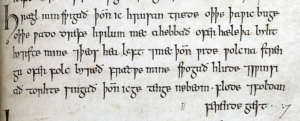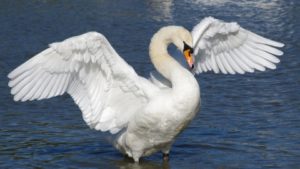Having recently translated Exeter Book Riddle 7 in my recent blog on esotericism in a sequence of Old English riddles (“Encoded References in Exeter Book Bird-Riddles“), I have decided to add my translation and recitation of this poetic enigma for our ongoing medieval poetry translation and recitation project. I accept the Old English solution swon “swan” as the poem’s solution based on parallel descriptions of swan’s singing feathers found in the Old English Phoenix likewise contained in the Exeter Book (Exeter Cathedral Library MS 3501).

Old English Riddle 7 (solution: swon):
Hrægl min swigað, þonne ic hrusan trede,
oþþe þa wic buge, oþþe wado drefe.
Hwilum mec ahebbað ofer hæleþa byht
hyrste mine, ond þeos hea lyft,
ond mec þonne wide wolcna strengu
ofer folc byreð. Frætwe mine
swogað hlude ond swinsiað,
torhte singað, þonne ic getenge ne beom
flode ond foldan, ferende gæst.

“Exeter Book Swan-Riddle:” A Modern English Translation by Richard Fahey:
“My dress is mute, when I tread the ground, or occupy my abode or stir the water. Sometimes my garments and this high wind heave me over the city of heroes, and then the strength of the skies bears me far and wide over the people. My adornments then resound loudly, and ring, and sing brightly, when I am not hanging on sea or land, a traveling spirit.”
Richard Fahey
PhD in English
University of Notre Dame
